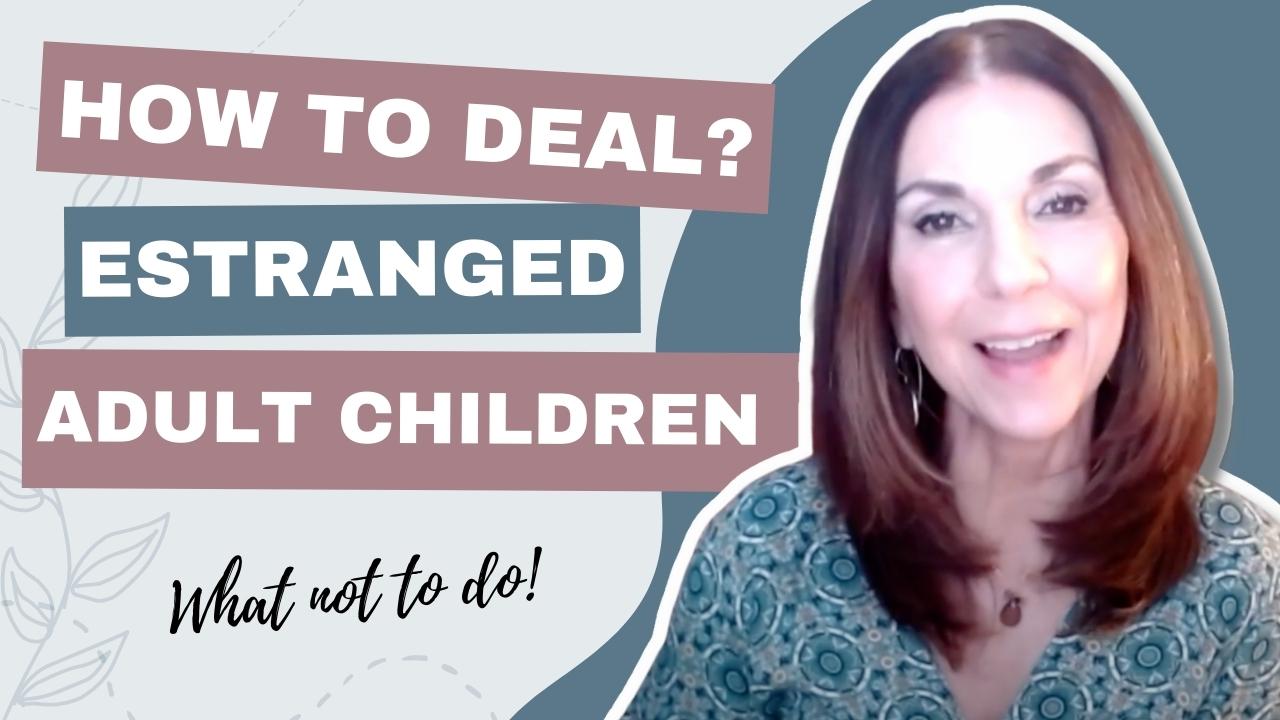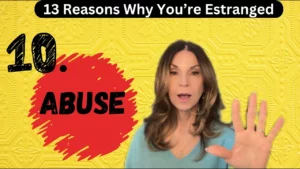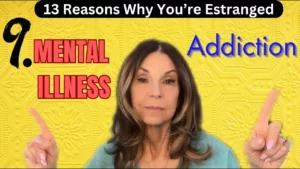Estrangement is a relatively new term describing cut-off and alienation from a family member. At least 27% of the U.S. population admit to having this condition. Interestingly, so many are ashamed that they are less likely to accept being estranged. For this reason, the epidemic of being rejected by one or more family members is widespread. This article shares my top five don’ts: what NOT TO DO with your estranged adult children.
I’m giving away a FREE copy of my eBook here: Feeling Heartbroken and Alone? How to Pick Up the Pieces When You are Estranged.
No one starts off thinking in their wildest dreams that one day their adult child will kick them to the curb. Certainly, When your kid decides to cut off from you, it’s worse than getting kicked in the teeth. It’s more like getting run over by a semitrailer repeatedly.
More than likely, your goal is to reconnect and reconcile. You may be filled with strong emotions such as regret, anger, fear, frustration, loss, grief, and confusion. To prepare and continue towards the path to be reunited, here’s what you need to steer clear of:
What Not to Do with Your Estranged Children
Psychologist and author Joshua Coleman describes the Five Most Common Mistakes in his book Rules of Estrangement. Coleman’s vantage point is having reconciled with his adult daughter after divorcing.
You will find his book extraordinarily useful in your quest to be informed. Unfortunately, the journey to your goal may require a lot of patience and thick skin.
Remember that information is your ticket to your destination. This is due in part to the painful nature of estrangement and the inclination to personalize, ruminate, and worry.
1. Believing that Reconciliation Should be Based on Fairness Instead of Thoughtful Work
The temptation to remind your adult child how much you did for them may be significant. You may want to defend yourself. And tell them what a good and decent parent you were. Especially when we are hurt and vulnerable, it is natural to want to protect our point and make a convincing case of how their actions are misguided. Many triggers are hurtful things they say or their decision to block communication entirely. Expressing your anger and hurt to them will undoubtedly create an enormous schism between you.
You will need to develop a thick skin and go into your opportunities for connection without expectations. Focus on the little progress did they respond to your text?
Are they going to an event you will also attend? Do they respond to you even seldomly? These are the small wins you will need to fuel your tank to be ready for the long haul.
There is nothing fair about this arrangement, especially since they hold all the aces and picture cards. Learn to behave as respectfully to them as you want them to be but even better.
Learn how to say, I hear what you are saying; I see your point. Leave it there and refuse to engage in defensive behaviors.
If there has been parental alienation, where your spouse painted you negatively, don’t negatively paint the other parent.
2. Using Guilt to Make Your Adult Child Treat You Better
Your adult child may have developed their schema of what they want in your relationship. Being guilty and obligated to see or speak to you goes against their grain of doing what they think is best. Many adults do not want to feel obligated to do things on their terms. In short, lose the guilt-tripping. Do your best to not pull the guilt trip card. Guilting your adult kid will backfire.
3. Returning Fire With Fire
Being cut off causes one to be angry, among other strong feelings towards their adult child. Of course, it is infuriating. To be cast aside as though you do not matter is horrendous. If you are intensely angry, you will need to take that to your therapist. Once you have cooled off, use your best communication skills to listen to what they volunteer. They may say things that blindside you or remind you of stuff you regret. Take a deep breath and respond calmly.
Listen intently. Remember what your adult child is telling you to determine if there is a need to read between the lines. Learn how to validate. Validating is repeating what they say empathetically without your side of the equation. Quit justifying what you did was the best you could, even though this is true. They need you to focus on their feelings. When we explain and are defensive, we become less attractive to them. If you want reconciliation, you want them to see you as someone who gets them.
No one suggests you tolerate disrespectful behavior, and there should be boundaries.
Be prepared to create a well-stated, clear boundary. Boundaries must be easy to remember and can be able to adhere.
Talk to a therapist who can also provide a safe place to ventilate. You will learn to respond to your adult child in a safe, non-judgmental manner. Listening, validating, and not defending yourself will assist you in your quest to make amends and reconcile.
4. Thinking That Reconciling Will Happen Quickly
There is no time frame you can predict. You cannot demand when and how you might reconcile. Chronic stress is also commonplace among individuals in the limbo state of estrangement. The degree of uncertainty and strong emotions complicate one’s well-being.
Commit to taking care of yourself, learning how to calm down, and lessen the stress you feel. Commit to attending to the business of self-care, so you still find joy with your other kids or with others you enjoy.
5. Assuming That Your Kids Distant Behavior is All About You
Your child’s rejecting behaviors feel personal. After all, why on earth would your kid in their right mind decide to detach from you, their parent. However, this is the hand you have to deal with, so be wise. Indeed, our adult children have stressors that differ from ours. They are focused on creating their paths. Your adult child is still figuring out their place. They may be struggling in their jobs, intimate relationships, and self-evaluation.
What to Do Instead
While you wait on them, you will sharpen your communication skills. Speak to a therapist so you can freely ventilate. Remember, do not express your angst with your adult child. Prepare to make amends for what they tell you that troubles them about what you did. A therapist will help you find humility without traveling the road to self-incrimination.
Make a list of all the good things you have done as a parent and remind yourself often. Resist the temptation to tell your adult child. Remind yourself of the sacrifices you made.
Do the self-talk- keep telling yourself that you did the best you could.
Estrangement is a relatively new term describing cut-off and alienation from a family member. At least 27% of the U.S. population admit to having this condition. Interestingly, so many are ashamed that they are less likely to accept being estranged. For this reason, the epidemic of being rejected by one or more family members is widespread. This article shared with you my top 5 tips on what not to do with your estranged children.
Get The eBook: Feeling Heartbroken and Alone? How to Pick Up the Pieces When You are Estranged.
Resources:
- Agllias, Kylie. Family Estrangement A Matter Of Perspective. New York, Routledge, 2017.
- Coleman, Joshua. Rules of Estrangement. New York, Harmony Books, 2020.
- Morin, Marie. Feeling Heartbroken and Alone? How to Pick Up the Pieces When You are Estranged. eBook. 2022.
- Morin, M.L. [Morin Holistic Therapy]. (2022, January 4 ). What is Family Estrangement? You Are Not Alone.
- Morin, M.L. [Morin Holistic Therapy]. (2021, September 8). Diaphragmatic Breathing: 5 Minute Deep Breathing Exercise for Beginners.
- Morin, Marie. How to Deal with Estranged Family During the Holidays (2021, November 21) Sixty and Me. https://sixtyandme.com/estranged-family-holidays/
- Pillemer, Karl. Fault Lines Fractured Families and How to Mend Them. New York Penguin Random House, 2020.









